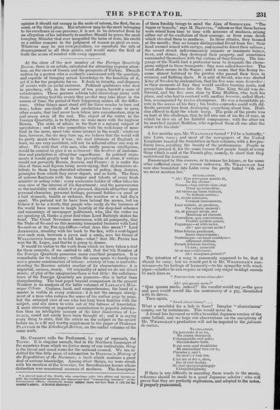Mr. COBBETT calls the Parliament, by way of reproach, the
THING. It is singular enough, that in the Northern languages of the countries from which we derive many of our institutions, thing is the literal and usual name for the national council. We are in- debted for this little piece of information to DEPPINC;S History of the Expeditions of the Normans; a book which contains a great deal of curious knowledge. Among other things, we were struck with his mention of the berserker, the Scandinavian heroes whose distinction was occasional accesses of madness. The description * A shrewd man of the North, who sometimes pries into affairs and favours us with his coufidential opinions, has discovered that "transacting business" at the Government offices, commonly means rfeither more nor less than a call for the quartves galary, A Scutch 414cinerY ! of them forcibly brings to mind the Ajax of SOPH0CLES. "The Sagas or legends," says M. DEPPING, "inform us that these heroes were seized from time to time with accesses of madness, arising either out of the exaltation of their courage, or from some drink which elevated them to madness. In these attacks, they foamed at the mouth ; they no longer distinguished friend from foe • their head seemed seized with vertigo, and ceased to direct their actions; the sword struck indiscriminately animate or inanimate beings, trees, and stones ; they destroyed their property, and sometimes surrounded themselves with the victims of their ferocity. The lan- guage of the North had a particular term to designate the cham- pions subject to these transports : they were called berserker. The word often occurs in the Sagas ; and it seems that this frenzy be- came almost habitual to the pirates who passed their lives in cruizing and fighting duels. It is said of Sivald, who was elected King of Sweden by acclamation, that his five sons were berserker: in their moments of fury they would swallow burning coals, and precipitate themselves into the fire. This King Sivald was de- throned, and his five sons slain by King Halfdan, who took his place, and who had to contend with another bemerke, called Hart- ben, accompanied by twelve champions. He was a formidable pi- rate in the access of his fury ; his twelve comrades could with dif- ficulty prevent him from destroying everything about him. Half- dan offered to fight the whole troop. The pride of the pirate was so hurt at this challenge, that he fell into one of his fits of rage, in which he slew six of his faithful companions : with the other six he marched against Halfdan, who repulsed them all one after the other with his club."


















 Previous page
Previous page